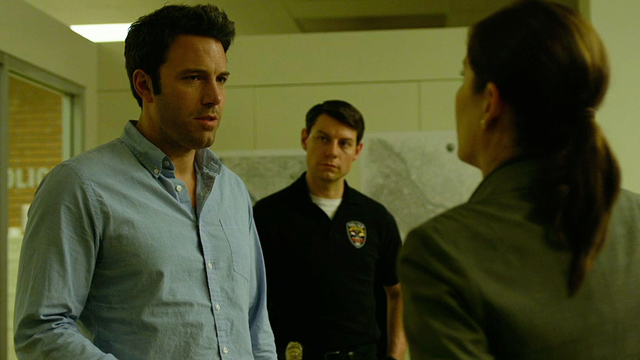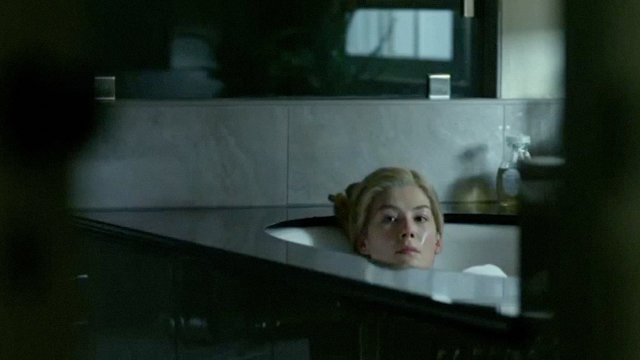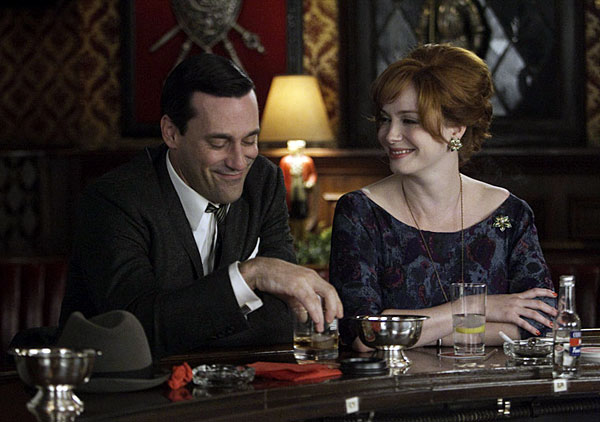 Gone Girl
Gone Girl
Written by Gillian Flynn
Directed by David Fincher
USA, 2014
It is a crime against the film world to label David Fincher’s newest, Gone Girl, with only one word or phrase. There are elements of “thriller” here, an essence of “police procedural.” There’s a teaspoon of “black comedy”, a dash of “recession-related social relevance”, and a heaping helping of “media satire.” What makes this film a fine meal is the way that Fincher, the consummate perfectionist, mixes them together in exactly the right proportions. It’s a piece of art as well-crafted as any dinner in New York, and just as much fun.
Nick Dunne (Ben Affleck) and his wife Amy (Rosamund Pike) are living their upper-middle-class lives in the Missouri town of North Carthage when Nick returns home and finds her disappeared, with signs of violence about the house. Amy was a minor celebrity even before they were married, which just makes the resulting media maelstrom all the worse: Pike’s head shots are popping up as graphics on the 24-hour news networks before Amy is gone even one day. As always happens in these cases, the husband is a convincing suspect. As the twists in the case fly fast and furious, he only becomes more so.
Now, any sane moviegoer might say, “there’s not a chance in hell the husband did it. He’s played by Ben Affleck!” But this is where Fincher proves his mastery. The camera is always at the precisely correct remove, keeping the audience close enough to Nick to root for him in one scene, and distant enough to doubt him in the next. The first time that Nick lies to the police, it’s so subtly presented that one might have to replay the scene in one’s head, to make sure that a deception just happened. If Nick is that good at lying to us, Fincher seems to be saying, when we were watching him the whole time, what couldn’t he lie about?
Affleck deserves a great deal of credit also, for finding every one of this character’s moral gray areas and applying a light touch to them. Affleck does not usually do subtle as an actor: his best roles have led with his straightforward, broad earnestness. But here he finds that sweet spot of grief, where he could actually be feeling dead inside or he could be pretending, until the exact moment that Fincher wants us to know the truth. The story first turns upon a moment when Nick chooses the worst possible time to give that Ben Affleck smile, and Affleck never tips his hand one way or the other as to why that might have happened.
That smile also activates this film’s most powerful weapon: our tendency to apply a Hollywood story to our decidedly non-Hollywood real lives. Everyone in this film expects Nick to act a certain way, and if he lets them down, he is immediately the prime suspect. Nick pushes back by telling a story that he claims to be the truth, and it doesn’t work because the Hollywood fantasy plays better on TV. It’s only once a hotshot lawyer (a shockingly good Tyler Perry) comes into play that he comes to understand: you counter the Hollywood story with another Hollywood story. In this film, reality is not presented as a place that, once departed, any of us can easily get back to.
There will be no spoilers in this review, but once the truth of the crime is revealed, the movie shifts onto a whole other plane. Prior to the big reveal, Gillian Flynn’ script (adapting her own best-selling novel) is fairly straightforward, to the point that this could be the snappiest, best-directed episode of Law & Order ever made. But after the reveal, all of the dark comedy comes into play, the media satire fills out all of the spaces where the film had started shallow, the score from Trent Reznor and Atticus Ross becomes more compelling, and the film’s stellar supporting cast steals the film out from under Affleck. Before the reveal, Fincher is simply a master with the camera; after, he becomes a master storyteller.
At the center of it all is the gone girl herself, and Pike’s stunning performance anchors the entire movie. As she tells the story of Nick and Amy’s marriage in flashback, it becomes clear that their meet-cute and courtship were just stories they told themselves, stories that can appear sweet in Fincher’s camera lens and bitter through the lens of the Nancy Grace-esque firebrand (Missi Pyle) bent on convicting Nick in the court of public opinion. Amy is a unique and unusual character, but she tells the same stories to herself that we all do, and she watches the same stories on the news that we all watch. In Pike’s luminous eyes, Amy’s story plays out as an armed assault, where the weapon is the media and we are rooting for the assailant.
— Mark Young





